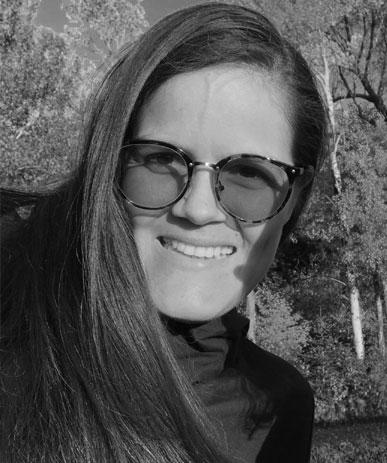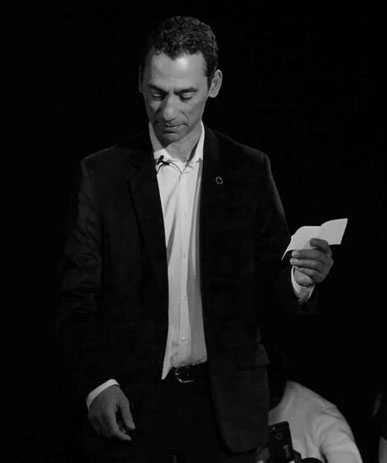No esperado, no imaginado
Soy policía, un proceso de trece años cinco meses y un día.
No esperado, no imaginado,
Mi vocación era de servicio
y mi presencia era el Estado, mi cuerpo la única presencia,
del Estado en el campo
Ni attendu, ni imaginé
Je suis policier, un processus de treize ans, cinq mois et un jour.
Je ne m’y attendais pas, je ne l’avais pas imaginé,
Ma vocation était le service
Et ma présence était l’État, mon corps la seule présence,
de l’État sur le terrain
Unexpected, unimagined
I am a policeman, a process of thirteen years five months and one day.
Unexpected, unimagined,
My calling was of service
And my presence was the State, my body the only presence,
Of the State in the countryside
La Libertad que perdí
La liberté que j’ai perdue
The freedom that I lost
¿Por qué, qué cambió?
Pourquoi, qu’est-ce qui a changé?
Why, what changed?
Afectaciones – Freddy Lafont Mena
Se frustró el anhelo
Un sueño de ver crecer a los hijos
Destruyeron familias
Comunidades indígenas, ¿cómo restituir el dolor causado?
Répercussions – Freddy Lafont Mena
Le désir frustré
Le rêve de voir grandir les enfants
Des familles détruites,
des communautés autochtones. Comment réparer la douleur causée?
Impacts – Freddy Lafont Mena
The desire got frustrated
The dream of seeing my children grow up
Families destroyed,
Indigenous communities, how to repair the pain caused?
Nadie puede olvidar, nadie va a devolver,
Vamos a restaurar el sentido de humanidad,
Trece años cinco meses y un día
Marcados en el rostro de mi madre,
Tatuados en la espalda de mi esposa
y en las historia de mis hijos sin su padre
Nadie puede olvidar nadie va a devolver
Vamos a restaurar el sentido de humanidad. Vamos !!!
Personne ne peut oublier, personne ne se rendra, nous restaurerons
Le sens de l’humanité, treize ans cinq mois et un jour
marqués sur le visage de ma mère,
tatoués sur le dos de ma femme et sur l’histoire de mes enfants sans leur père.
personne ne peut oublier personne ne se rendra
nous restaurerons le sens de l’humanité. Allons-y !
Nobody can forget, nobody will return,
The sense of humanity, thirteen years five months and one day
marked on my mother’s face,
Tattooed on my wife’s back and in the story of my children without their father
Nobody can forget, nobody will return
Let’s restore the sense of humanity. Let’s do it!
Muchas veces yo soñaba allá en la selva
En el piso rodeado de oscuridad
Bajaba una loma verde
Había un caserío
Yo huía de algo, quería ver gente y decirle
Llévenme donde mi familia espera para festejar conmigo
Souvent, je me suis retrouvé dans la jungle
Sur le sol, entouré d’obscurité
En bas d’une colline verte
Il y avait une ferme
Je fuyais quelque chose, je voulais voir des gens et leur dire
Emmenez-moi là où ma famille attend de célébrer avec moi
Many times I dreamt there in the jungle
On the floor surrounded by darkness
Down a green hill
There was a village
I was running away from something, I wanted to see people and tell them
Take me where my family waits to celebrate with me
Era un sueño
Resistiré, resistiré, resistiré
Estaba soñando era un sueño
Resistiré, resistiré, resistiré
Estaba soñando
Resistiré, resistiré, resistiré,
¿Es la libertad real?
C’était un rêve
Je résisterai, je résisterai, je résisterai
Je rêvais, c’était un rêve
Je résisterai, je résisterai, je résisterai
Je rêvais
Je résisterai, je résisterai, je résisterai
La liberté est-elle réelle ?
It was a dream
I will resist, I will resist, I will resist
I was dreaming, it was a dream
I will resist, I will resist, I will resist
I was dreaming
I will resist, I will resist, I will resist,
Is freedom real?
Resistiré, resistiré, resistiré …
Je résisterai, je résisterai, je résisterai …
I will resist, I will resist, I will resist …
La Libercación – Fredy Lafont Mena
Que la justicia impere, que los odios no llenen
Nuestros corazones, para que al final no busquemos venganza
que los jóvenes de hoy no sean indiferentes
Que la justice règne, que la haine ne remplissent pas
nos cœurs afin que nous ne cherchions pas à nous venger
Pour que la jeunesse d’aujourd’hui ne soit pas indifférente
May justice prevail, may hatred not fill
Our hearts, so that in the end we do not seek revenge
May the youth of today not be indifferent
¿Cuál sería la pena ejemplarizante? ¿Cuál sería la pena satisfactoria?
Para que las cadenas no se repitan
Para que el dolor no se repita
Quelle serait la peine exemplaire? Quelle serait la peine satisfaisante?
pour que les séquences ne se répètent pas
pour que la douleur ne se répète pas
What would be the exemplary penalty? What would be the satisfying penalty?
So that the chains are not repeated
So that the pain is not repeated
¿Cuál sería la justicia, cuál sería la justicia? ¿Cuál sería la justicia, cuál sería la justicia?
¿Cuál sería la justicia, cuál sería la justicia? ¿Cuál sería la justicia, cuál sería la justicia?
Quelle sera la justice, quelle sera la justice ? Quelle sera la justice, quelle sera la justice ?
Quelle sera la justice, quelle sera la justice ? Quelle sera la justice, quelle sera la justice ?
What would be justice, what would be justice? What would be justice, what would be
Justice?
What would be justice, what would be justice? What would be justice, what would be
Justice?
Queremos volver a preguntar en este camino siniestro
¿dónde está, dónde está?
¿dónde está, dónde está?
¿Cuál será la justicia, cuál será la justicia ?
¿Cuál será la justicia, cuál será la justicia ?
Nous voudrions demander à nouveau, sur cette route sans chemin,
où est-il, où est-il ?
Où est-il, où est-il ?
Quelle sera la justice, quelle sera la justice ?
Quelle sera la justice, quelle sera la justice ?
We want to ask again, on this path without a road
Where is it, where is it?
Where is it, where is it?
What would be justice, what would be justice?
What would be justice, what would be justice?


